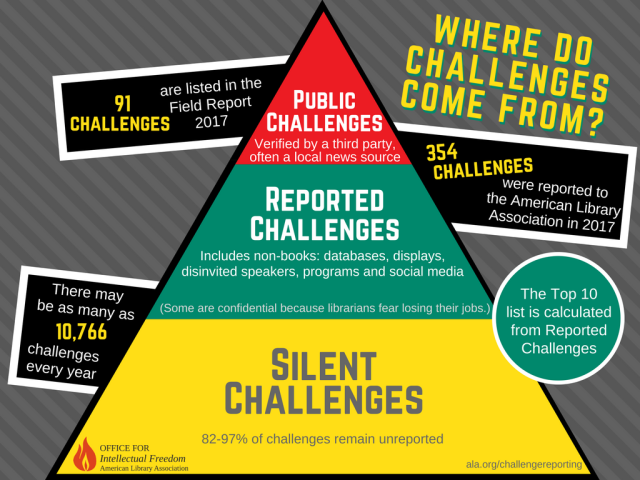So, how many challenges are there each year? As with almost anything else anyone wants to count, answering this question requires reliable evidence, and reports of challenges are spotty at best. The ALA offer this infographic, based on data collected in 2017:
I’ve always wondered how anyone guesses what percent of anything (crime, censorship, customer dissatisfaction) goes unreported, but even if we cut the estimated unreported challenges for 2017 by 90%, that still leaves 1077 challenges, i.e., nearly 3 per day, every day. No time off for weekends or holidays.
Today’s featured author is a reminder that poets are challenged/banned, too: Geoffrey Chaucer (died 1400). According to Poets.Org, The Canterbury Tales hit some road bumps when it was published in the late 1300s, but the real problems arose in the late 1800s:
In 1873, Anthony Comstock, founder of the New York Society for the Suppression of Vice, achieved a federal bill that banned the mailing of “every obscene, lewd, lascivious or filthy book, pamphlet, picture, paper, letter writing, print or other publication of an indecent character.” The Comstock Act, officially known as the Federal Anti-Obscenity Act, banned many world classics, including Chaucer’s Canterbury Tales, for its sexual content.
Now you’ve learned two things: what the Comstock Act was, and why The Canterbury Tales is still selling pretty well for a 600-year-old book. Let’s hear it for bawdy poetry!
Tomorrow: English teachers and censorship.




I am forever confused by the apparent conflict between the wording of the First Amendment and conservatives’ desire to ban material that they alone deem dangerous or unwholesome. Freedom of expression and freedom of belief, along with the right to freely assemble and peacably demonstrate, all seem anathema to the more extreme right even as they abrogate those rights for themselves.
LikeLiked by 1 person
I agree with you, Chris, but the question goes beyond “freedom of expression”, and liberals are as guilty as conservatives when it comes to silencing stories that are beyond the pale: people can say and write whatever cockamamie things they like, but woe to the person who prints or broadcasts those ideas.
As I wrote my BBW/6 post, I was thinking specifically of Ian Buruma, who had just lost his job as editor at the New York Review of Books because he published an essay by a man accused of sexual assault. I’ve read neither the essay nor Buruma’s apology, so I can’t speak to the specific content, but if publishing an accused person’s defense (no matter how heinous the crime) is justification for being fired, then we’re all in trouble (Sixth Amendment to the US Constitution). Latest coverage of the Buruma/NYRB events here: http://nymag.com/daily/intelligencer/2018/09/the-backlash-to-the-backlash-at-the-new-york-review-of-books.html
LikeLiked by 1 person
Yes, I’ll have a look at that today, and yes, the matter is more complex, less black and white than I suggested, and an ignorant European like me should fear to tread amongst the intricacies of the US Constitution!
LikeLiked by 1 person
Actually, we could use interference from just about anyone these days.
LikeLike
Just been following the updates on the Kavanaugh hearing. Can’t help thinking some senators need to be metaphorically if not physically grabbed by the labels and shaken to remind them this is about honest respect, compassion and humanity, not partisanship.
LikeLiked by 1 person
I suspect many of them are concerned about what might pop up out of their own pasts.
LikeLiked by 1 person